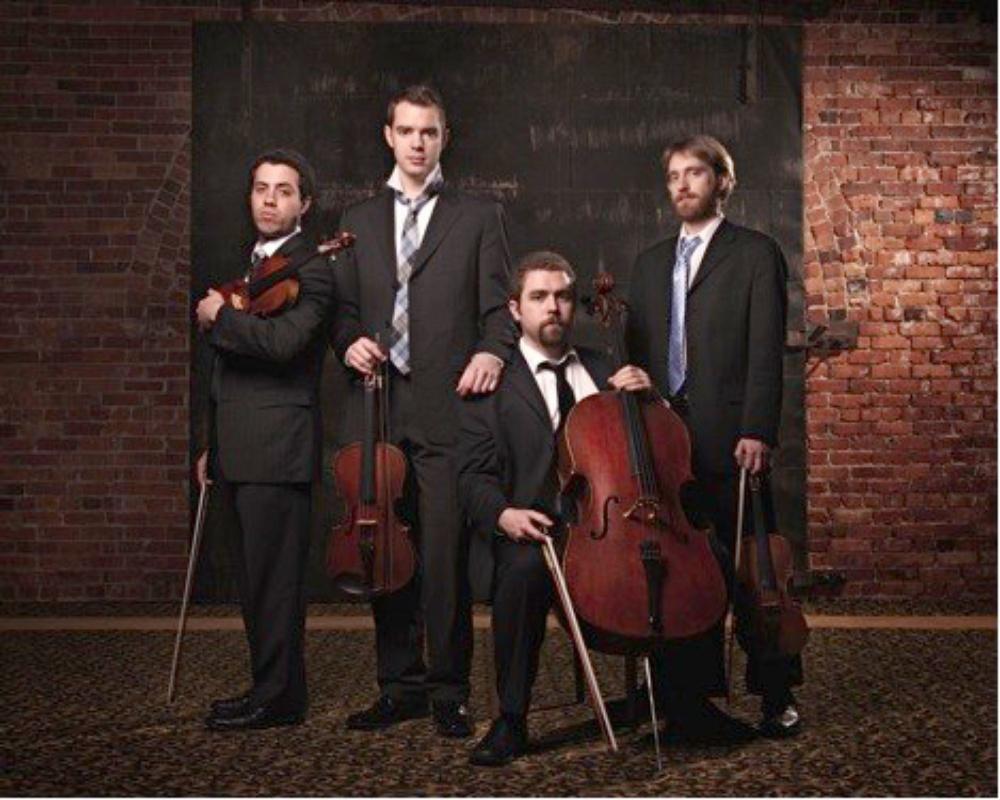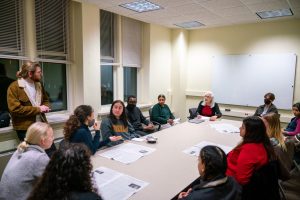Interview with the JACK Quartet
For an exciting three days, Oberlin hosted the edgy and modern JACK Quartet. The group not only offered what NPR called “the best New York Alt-Classical Concerts of 2010,” but also educated Obies in contemporary string technique, composition and chamber music. The Review had the chance to speak with the JACK Quartet before their Tuesday, Feb. 22 concert.
From left: Ari Streisfeld, violin, John Pickford Richards, viola, Kevin McFarland, cello, and Christopher Otto, violin take on tough music and tough crowds.
February 25, 2011
Why “JACK”?
Ari Streisfeld: It’s an acronym — John, Ari, Chris and Kevin. We specialize in contemporary music, and one of the first pieces we played together was the third string quartet by Helmut Lachenmann, the German composer. It’s called “Grido,” which means “scream” in Italian. But it is also an acronym for the members of the Arditti Quartet, for whom [the piece] was written. While we were working on it, we were joking around saying, “If this piece was written for us, it would be called ‘Jack.’” Then, when we needed a name, it just felt right.
John Pickford Richards: The nice thing about that is our formation was due to Lachenmann.
AS: Yeah, we got to work with him a lot.
JPR: It was such an inspiring experience, and when we finally organized as a non-profit organization, he signed our articles in preparation. He is really kind of our father, or grandfather. [laughs] We don’t have a father — only a grandfather.
In playing contemporary music, how do you guys think about the “individual versus the group” sound?
Christopher Otto: I think, as a group, we approach things pretty democratically. Each piece is individual, though, and there can be a different interplay between how soloistic or blended our parts are. I think contemporary music explores this relationship more than traditional music, so we have to be very flexible.
AS: Like Chris says, it really depends on the piece of music. In classical string quartet music, especially Haydn and Mozart, the first violin dominates with a lot of soloistic figures, and as quartet music goes further into the Romantic period, these figures become more unified in terms of their being passed around between instruments. It’s even more apparent in contemporary music. Chris and I switch between violin parts, but the difficulty level of each remains the same — the second violin part can seem like the first.
This aspect really does depend on the piece, and one of our goals is to find the sound of each composer’s piece we play. Often, we get to work with the composer to find that, but such as the case of Xenakis and Ligeti, they passed away before we were able to learn and perform their quartets. Therefore, we have to base the concept of their pieces’ sound off of what we know of their music, recordings and from the people who worked with them.
During your formation as a quartet, did you guys see yourselves coming together to educate the public about “new music”?
Kevin McFarland: It’s a part of our mission statement, and we want to expand the audience for “new music.” Recently, we’ve had a great opportunity to play on chamber music series concerts that don’t often program contemporary music. Overall, responses have been good. You just have to be careful with programming and take baby steps into the pool. Start off easy, then build into something crazy. Sometimes, you might just want to jump in.
AS: We’ve done this in a few different ways. We just played a show in Huntsville, Alabama, and much to our surprise, 800 people showed up. The program was geared toward an audience that may not be so in-tune with contemporary music, so we paired two arrangements of early music by Guillame Machaut and Carlo Gesualdo, as well as Philip Glass and Xenakis. Because the Glass is so beautiful, with the use of traditional harmonies, audiences used to this are ready to hear the Xenakis — which is quite insane. Like Kevin said, we build up to it.


























